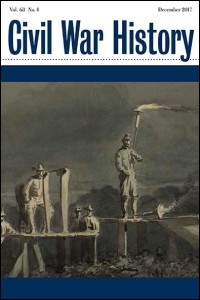December 2017, Volume 63, No. 4
Sep 15th, 2017Escaping the Mechanism: Soldier Fraternization during the Siege at Petersburg
Lauren K. Thompson
During the American Civil War, Union and Confederate soldiers fraternized with one another despite strict prohibitions from the high command. As historian Lauren K. Thompson explains, fraternization was a recurring event in the life of a common soldiers seen both in the extent to which soldiers wrote about it in their letters and diaries, as well as officers’ attempts to curtail it. Soldier accounts emanate a sense of real or imagined uncertainty because of the major gap between what men expected from war and what they actually experienced. Men saw military service as a way to strengthen and display their independence but quite the opposite happened when under the military mechanism. By using what they had at their disposal, both commodities and their environment, men fraternized to test boundaries of authority and gain a sense for how much freedom they actually had. Thompson explores the gridlock at Petersburg and the siege warfare that forced the leadership of both armies to prepare their men for the intricate arragement of ceasefires to placate the constant sense of anxiety. Even when the high command cracked down on fraternization through very rigid penalties and public court martial sentences, soldiers continued to assert their autonomy through these means. As Thompson concludes, fraternization allowed men to escape their situation briefly in subtle ways that were socially acceptable to their comrades and did not carry the stigma of cowardice.
The Early Indicators Project: Using Massive Data and Statistical Analysis to Understand the Life Cycle of Civil War Soldiers
Earl J. Hess
Historian Earl J. Hess asks us to once again think about Robert Fogel’s initiated statistical project known as the Early Indicators Project. The data collection resulted in extensive information related to nearly 40,000 Union soldiers, tracing their military service, medical records, and pension files. Hess asks us to once again consider this database and how it can potentially shape the field in exciting and important ways for the future.
Earl J. Hess holds the Stewart W. McClelland Chair in History at Lincoln Memorial University, Harrogate, Tennessee. He is the author of more than twenty books, most recently Braxton Bragg: The Most Hated Man of the Confederacy (University of North Carolina Press, 2016). His study of Civil War Infantry Tactics: Training, Combat, and Small-Unit Effectiveness (Louisiana State University Press, 2015), received the Tom Watson Brown Book Award of the Society of Civil War Historians.
Lauren K. Thompson is an Assistant Professor of History at McKendree University in Lebanon, IL. She received her PhD from Florida State University in 2015. This article is part of her larger project, Friendly Enemies: Soldier Fraternization throughout the American Civil War, which will be published by University of Nebraska Press.
Book Reviews
Bonner, Michael Brem. Confederate Political Economy: Creating and Managing a Southern Corporatist Nation. Reviewed by Bruce E. Baker.
Barreyre, Nicholas. Gold and Freedom: The Political Economy of Reconstruction. Reviewed by David K. Thompson.
Tarter, Brent. A Saga of the New South: Race, Law, and Public Debt in Virginia. Reviewed by Sharon Ann Holt.
Grinspan, Jon. The Virgin Vote: How Young Americans Made Democracy Social, Politics Personal, and Voting Popular in the Nineteenth Century. Reviewed by Julie Mujic.
Matsui, John H. The First Republican Army: The Army of Virginia and the Radicalization of the Civil War. Reviewed by Robert Hunt.
Sweet, Timothy, ed. Literary Cultures of the Civil War. Reviewed by John Casey.
Mason, Matthew. Apostle of Union: A Political Biography of Edward Everett. Reviewed by Rachel Shelden.
Lause, Mark A. Free Spirits: Spiritualism, Republicanism, and Radicalism in the Civil War Era. Reviewed by Asaf Almog.
Ford, Bridget. Bonds of Union: Religion, Race, and Politics in a Civil War Borderland. Reviewed by Kelly D. Mezurek.
Huebner, Timothy S. Liberty and Union: The Civil War and American Constitutionalism. Reviewed by Jonathan Lande.


